In the early days of the internet, search rankings were as easy as pie. All you had to do was stuff some keywords on a page and you’d likely rank for that term.
Today, things are quite different.
It’s becoming increasingly difficult to dominate search engine results on any keyword, regardless of competition.
But that doesn’t mean it’s impossible.
It just means you have to be smarter than your competition.
If you want to rank for anything on Google, you must first start by setting your sights low. It’s a balance between finding a low competition keyword and a keyword that will deliver traffic to your website.
Virtually anyone can rank for a nonsense term that’s not being used by anyone else. But herein lies the problem: virtually no one is searching for that term.
Finding niche keywords is all about finding attainable keywords that will drive traffic to your website.
You may have heard of these referred to as long tail keywords. And if you search for the term long tail keywords, you may find some good advice. You may even find some keyword tools to help with your research.
and while keyword tools are definitely helpful, they don’t offer the full picture. They can’t.
In order to find the perfect key words, you need a balance of technology and intuition.
In this guide, we’re going to cover 10 tips for finding the money keywords in your niche.
Start with intuition
If you were searching for the products that you sell, what would you search for? What types of questions would you need the answers to? What problems do you have?
In the beginning of this process, you’re going to come up with a bunch of keywords that are probably very competitive. That’s OK.
If you’re able to identify those keywords that are terribly competitive now, you can ignore them. But if there’s anything you’re unsure of, simply write it down. Make a list of keywords that you might want to target.
From here, you can use various methods (that we’ll cover in detail) to find out whether they are money keywords as-is or whether you should find a longer-tailed version. So, keep this list on hand as you go through these steps.
Use Google Suggest
Do you know how Google likes to anticipate what you’re searching for? Before you even finish writing your search query, Google is already guessing what you want. This isn’t arbitrary. It’s based on commonly typed patterns. So, if you type your basic search term, you’ll get a list of a few potential searches. Google is telling you what people are looking for.
And when Google speaks, we listen.
Explore those keywords and write down any that seem to work for your brand.
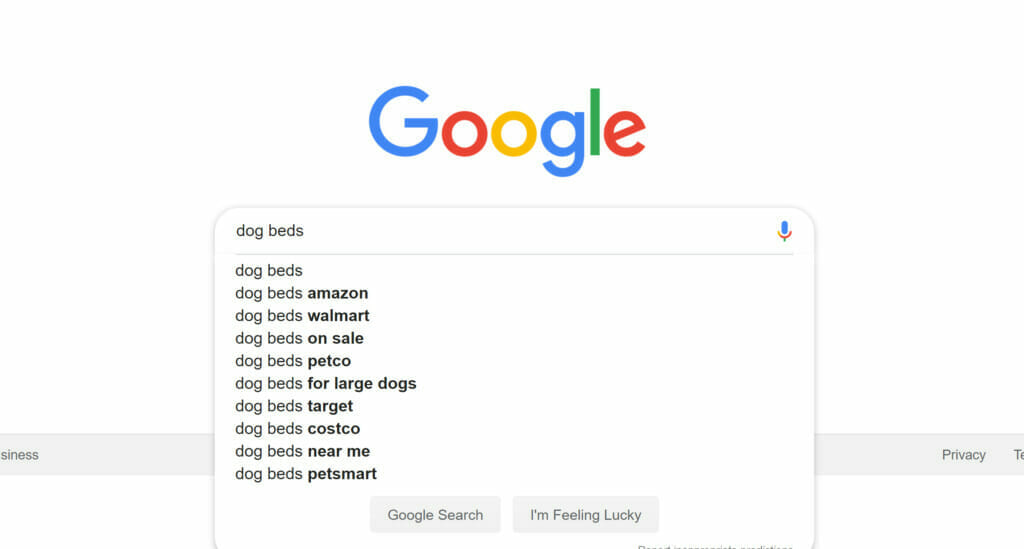
As you can see from the example above, a search for “dog beds” returns quite a few suggestions. Because many of them indicate a search for a specific store or location, in this case, you’d want to focus on the remaining keywords:
- Dog beds for large dogs
- Dog beds on sale
But just because these are longer than the original keyword doesn’t mean they’re money keywords. They could still be too competitive for you to target with a new site. Just hang on to them as you go through the steps outlined here, and you’ll get more insight on which keywords are worth targeting.
In most cases, you’ll want to take things a step further by exploring each new keyword with Google Auto-Suggest.
- Enter keyword (dog beds for large dogs in this example)
- Review the keywords that Google suggests to see if any are applicable to your business.
In this example, you can see that many of the keywords have to do with a specific store or price, so you can rule those out.
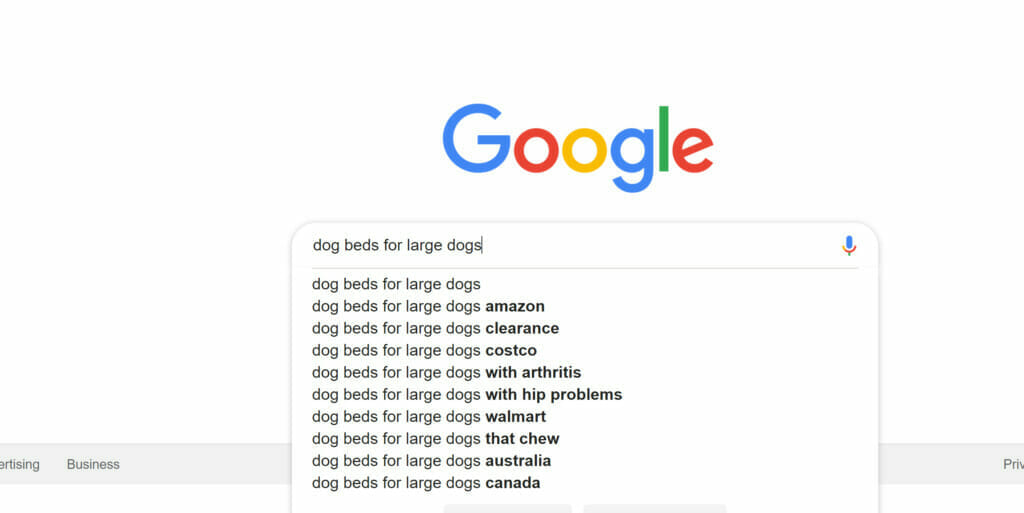
But what you’re left with is pure gold. The following keywords tell you specifically what people are concerned about when shopping for dog beds for large dogs:
- “with arthritis”
- “with hip problems”
- “that chew”
If you have products that address these concerns, focus your efforts on them.
Leverage Google Suggest
Now that you’ve gotten the hang of using Google Suggest to find keywords, you can have a little fun with it – and maybe come up with some more long-tail keywords.
Choose a hyper-relevant keyword in your niche and enter it into the search bar. Then, enter the first letter of the alphabet and see how the suggested searches change.
What you’re getting now are searches that are still common, but they may be less competitive because you’ve narrowed it down to a letter.
Go through the entire alphabet this way until you find enough keywords to target.
The following image shows you the suggested terms for the keyword + B.
You can do this for every letter of the alphabet until you have a list of good keywords to target.
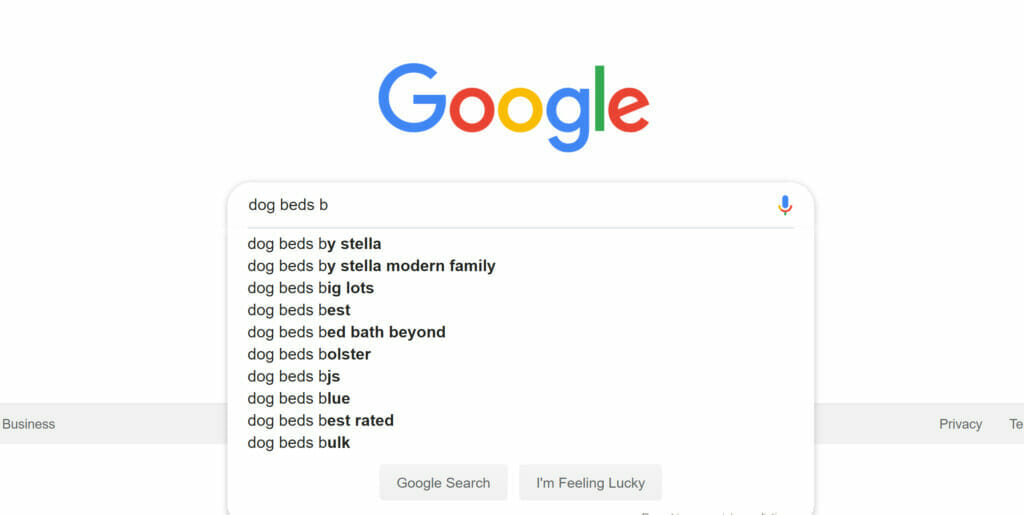
Use Google Related Searches
Whenever you perform a search on Google, Google will provide you with similar search terms that people have used and questions people commonly asked.
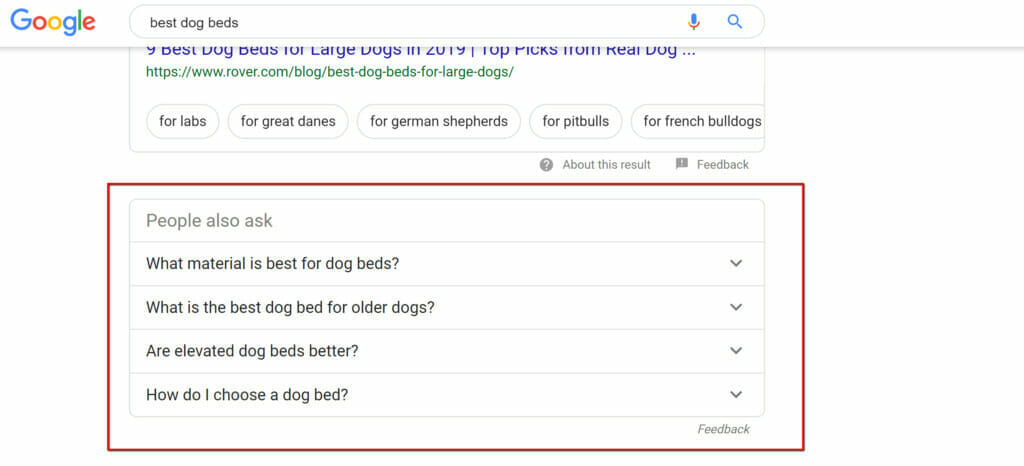
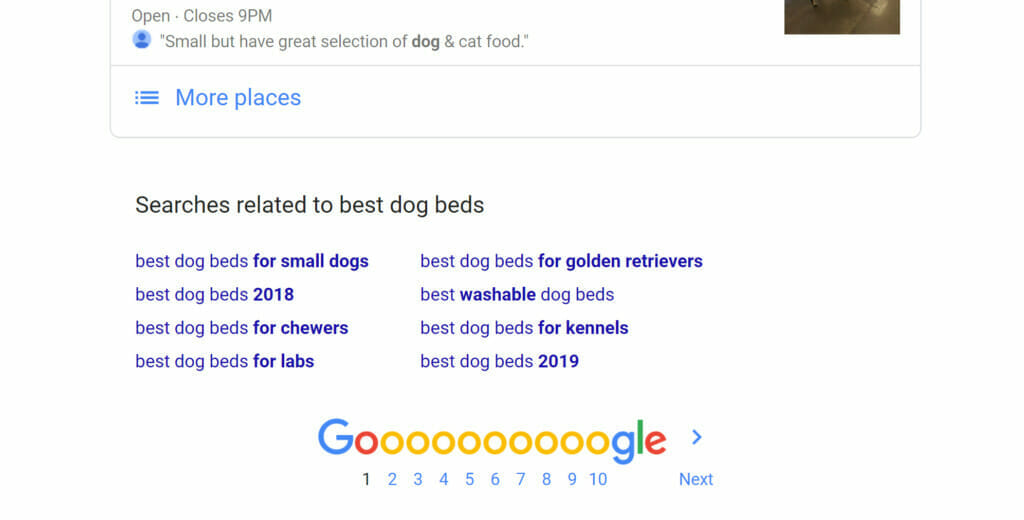
This is a veritable treasure trove of keyword ideas. And there often unless competitive topics than the keyword you initially searched. You can follow a string of these keywords by clicking in the people also searched category every time you perform a search. And even if you start with a competitive keyword, you’re likely to get to a keyword that is less competitive with this method.
Keyword research tools are great, but they don’t quite have the information that Google does. And it’s important to remember this period any keyword research tool will give you an estimate of search volume, but it’s not always accurate. Again, it’s an estimate.
Even Google’s keyword research tool doesn’t always give you the best information for organic search. This is because Google’s keyword research tool is designed for advertising purposes. It’s an AdWords tool that we often use for organic research.
This isn’t to say you should shun these tools. They can be very helpful, and in fact, we’re going to use a few tools later on in the process. For now, it’s important to do a little common sense of investigation.

Search Q&A sites
Question and answer sites are an invaluable resource for finding long-tail keywords. On sites like Quora or niche-specific forums, you can find out exactly what people are searching for. Simply enter your main term and browse through questions.
Some of these will be too competitive to go after, but make note of the popular searches. You can then search them on Google and/or run them through a keyword research tool to find out whether they’re worth pursuing.
Not every question you’ll find here will bring traffic, but you will become very savvy overtime at determining which keywords are best for your business.
See the next tips on determining user intent for more info on how to know whether a keyword will drive paying customers.
Let’s look at an example.
- Type your main keyword into the Q&A site Quora. In this example, we’re going to continue with dog beds.

- Review the results to find out what people are interested in around your topic.
If you’ve been following along, you can instantly see some synchronicity between these results and the Google Suggest results.
- Which are the best orthopedic dog beds?
- What is the best chew resistant dog bed?
These are great searches to target and could be perfect blog post topics (linking to your product pages, of course).
Determine user intent
Traffic is useless to you unless the people visiting your site want to buy. This is where commercial intent comes into play, and this is another area where you need to rely on your own brainpower over any tools.
You have to put yourself in the user’s shoes for a moment. Think: If I entered this term, what action would I want to take?
Typically, DIY searches do not have commercial intent – unless you’re selling materials for a DIY project.
If someone searches “how to make my own gown,” it’s going to be an uphill battle to get that searcher to buy anything but fabric and thread from you.
So, while you’re looking at various keywords, you’re definitely going to come across a few that have zero commercial intent. In these cases, it doesn’t matter how easy they are to target or how much traffic you might get, it’s a waste of time.
If you sell dog beds, for example, the money keywords you’ll look for might be around a specific type of dog bed.
Maybe you can rock the term “oversized polyester dog bed.” Or something along those lines.
Imagine the intent of people searching for this term. They aren’t looking for fun. They’re looking to buy it.
On the other hand, if someone were to search, “how to make an oversized dog bed” or even “pictures of oversized dog beds,” they don’t have clear commercial intent.
Over time, you’ll get better at spotting those money keywords that will drive interested buyers to your site. But first, you may need to stop and think about each one.
Review the focus of top results
Here’s another trick that can help keep you from targeting the wrong keywords. Take a look at the top results. If they’re completely irrelevant to the search term, you may have touched on a keyword with extremely low competition.
But there’s another case that actually is a red flag…
Let’s say you search for something that you think has commercial intent, but none of the top search results are products (or blog posts about choosing products). This could mean that Google sees the keyword as more of an informational search than a commercial one.
So, if you know you’re not the only one selling these products, but you don’t see any mention of products in the top results, this may be a difficult keyword to target for relevancy reasons.
Google does a lot of testing in order to deliver the most appropriate results. So if Google isn’t showing commercial results, they’ve probably determined that the user is looking for something else.
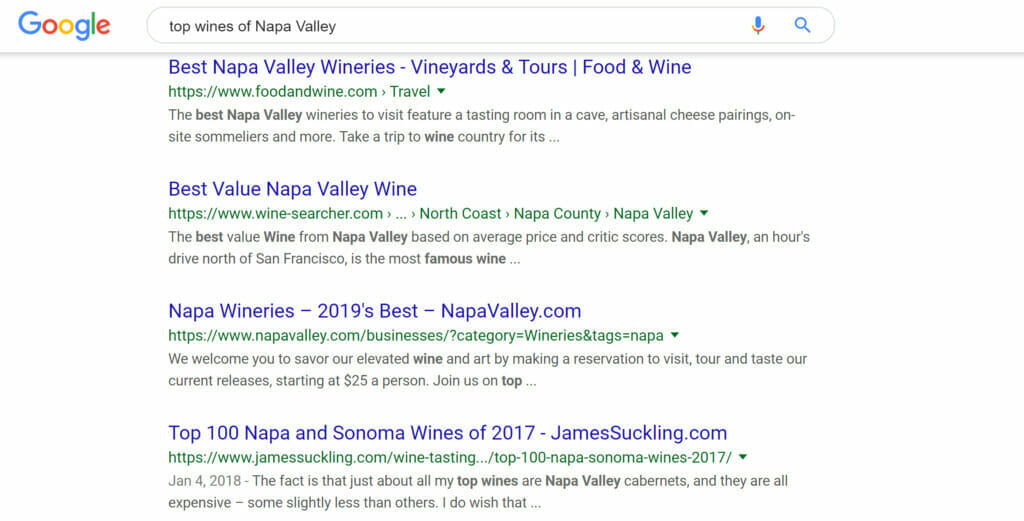
Here’s an example:
You enter the term “top wines of Napa Valley.”
The top search results show informational pages about wine varietals and not actual wines for sale, so it’s probably not the right keyword to target for commercial intent.
You know that there isn’t a shortage of top-rated wines from this region. But the search results don’t even show one of them. This means that Google is purposely keeping commercial sites out of the top results, likely because they’ve determined user intent is for information.
But there is a caveat…
You could target a keyword like this with a blog post and direct traffic towards your product pages. In fact, that’s advisable.
Take a quick inventory
You don’t need to spend a ton of time on this, but you can evaluate the competition on a keyword based on site alone. We’ll dig deeper with keyword research tools, but in this step, we’re going to eliminate the keywords that are obviously too competitive to target at this point.
After you enter a keyword, take a look at the top three search results. You want to look for one of 3 things:
- Are the top results industry leaders?
- Are the posts long and in-depth?
- Are the pages relevant to this search?
- Do you see forum results?
If your answer to the 1st question is yes, this keyword may be too competitive for you to target right now. If the top 3 results are from the biggest names in your industry, it’s going to be very difficult to knock them out of their position. This means you will likely never get one of the top three positions. And if you don’t have one of the top three positions, you’re probably not going to get very much traffic from that keyword.
But if it looks like there’s some wiggle room within the top 3, move on to the next question. take a look at the content on each of the top 3 results. Can you produce a page that address is the search term better than the top 3 results currently are addressing it? If so, you may have a chance at ranking within the top 3.
And now for the final and most important question. Google does a good job of finding relevant pages to return for each search result. But even with the hundreds of thousands of pages on the Internet, there still is not a page to answer every question perfectly. This is where you have some opportunity.
You can bet that all of the very competitive keywords will have pages that answer the search thoroughly. But the money keywords are a balance between competition and traffic.
These search results probably don’t have enough traffic for the industry leaders to focus on. And that leaves room for you to answer that search results thoroughly and potentially gain a number one ranking.
And finally, do a quick check to see if there are forum results in the top 10. If there are, you can bet this keyword isn’t very competitive, and you can probably achieve first page rankings with ease.
Quora is a great example of a forum result that often floats to the top of search results when a keyword isn’t terribly competitive. So if you see a Quora result, you’ve got this.
Make a list of all the keywords that seem appropriate to target. In the next step, we’re going to use a keyword research tool to help evaluate the competition.
Use a keyword research tool
For this example, we’re going to use SEMRush. SEMRush is a great keyword research tool with a comprehensive set of resources included. And the paid plan is well worthwhile for anyone with a website, especially once you’re making some money.
But for now, you can start with a free 7-day trial to find keywords to target.
Simply create your account, go to the dashboard and enter your keyword (“dog beds” in this example). You will get detail report like this:-
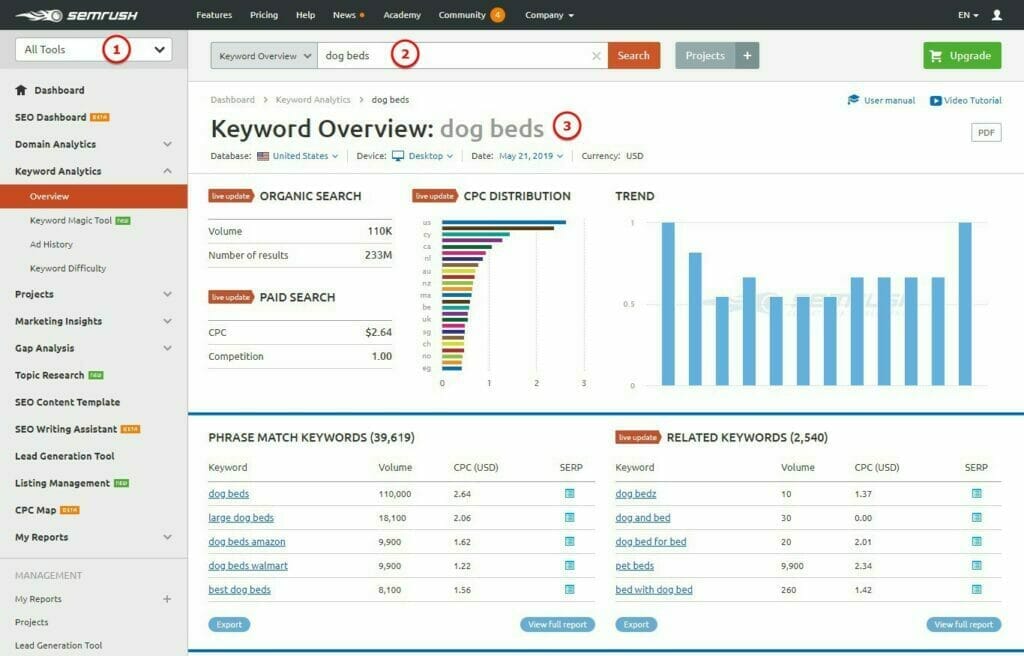
Now navigate to the keyword difficulty tool within the Keyword Analytics category.

Enter as many keywords as you’d like. If you have a free plan, you’ll be limited to 10. But if you’re taking advantage of the 7-day free trial, you can enter as many as you’d like.
For each keyword, SEMRush will assign a Difficulty %. This is a number on a scale of 1 to 100 with 100 being most difficult.
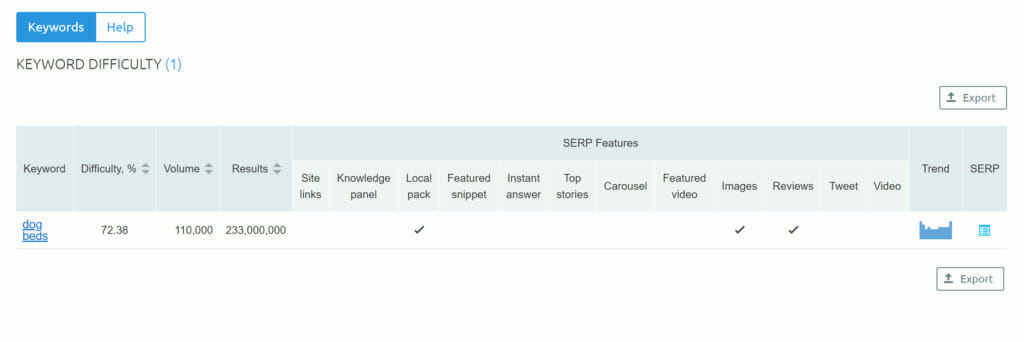
So as you can see, the search term “dog beds” is rather competitive at 72.38%.
When you’re just starting out, you’ll want to target keywords that are 50% or less (ideally in the 30 to 40 range).
If you enter a term and the results show that it’s “not in Google’s database,” the search volume is going to be too low to bother targeting.
Use Google Keyword Planner
Google’s Keyword Planner is a great tool to help you find and explore long-tail keywords. But as mentioned above, it’s really meant as a tool for Adwords campaigns, so the information you’ll get will be tailored towards ads. There may be some low-volume keywords that wouldn’t make sense for an ad, but they make perfect sense for organic SEO.
As such, you may find that the competition isn’t the same for ads and organic search. Although terms that are competitive for ads are usually competitive for organic search too (and vice versa), you may find a few keywords that are the exception.
Still, the Google Keyword Planner is a great free tool to help you find keywords you may not otherwise consider.
- Step 1: Start with your main keyword.
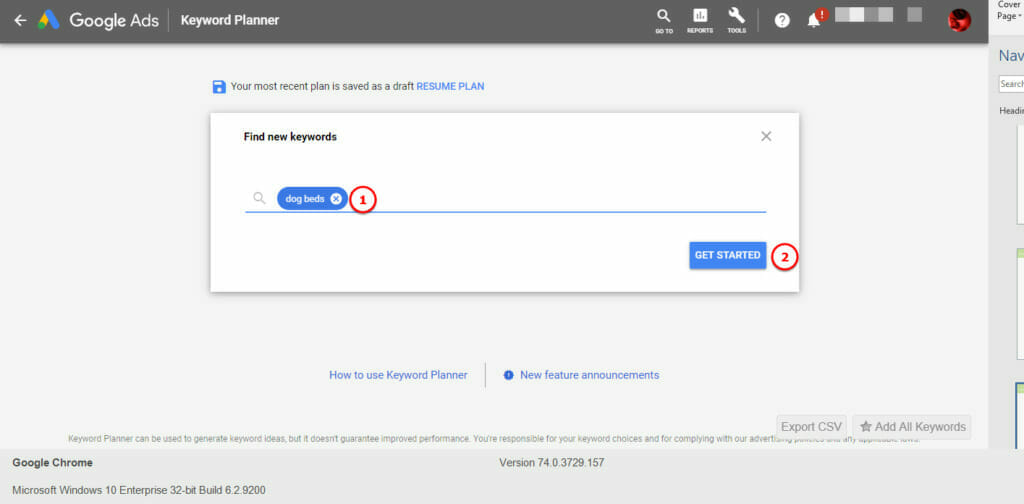
- Step 2: Click on the “keyword ideas” tab to find all related keywords.
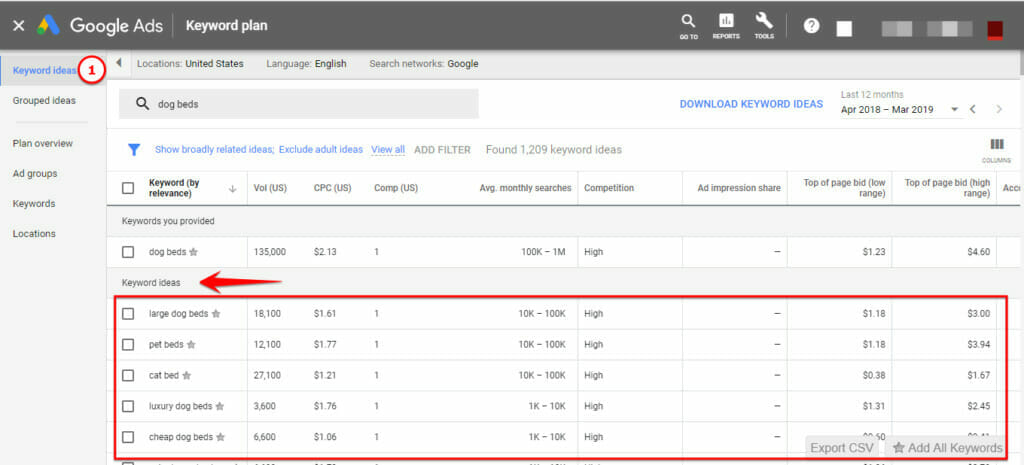
- Step 3: Employ that common sense check to see which keywords may drive traffic and paying customers to your website. The keywords must have some commercial intent, drive some traffic and have low competition.
- Step 4: Copy the keywords and enter them, one at a time, into the search bar to find long-tail keywords around your main keyword.
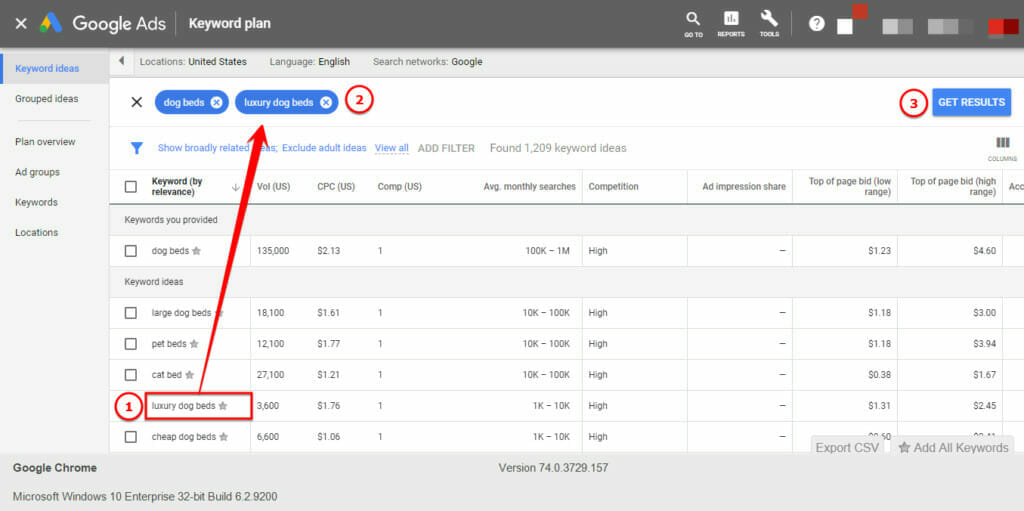
Frequently Asked Questions
What are keywords examples?
Dog beds for large dogs with hip problems. Dog beds for large dogs that chew.
How do I find best keywords?
What is your niche? Study it. Define your goals. What topics are relevant? Create keywords. Utilize the research tools. Study what these tools show you. Find long tail keywords from what comes back. Look at competition.
What are different types of keywords?
There are 9 types of keywords: shorttail, longtail, long-term, short-term, customer defining, product defining, LSI, intent targeting and geo-targeting.
How do keywords work?
A keyword is a word that describes the content on your page/post best. Then search sites, such as Google, uses this information to determine what content is relevant to a specific search. This determines the rank.
Conclusion
No one is claiming that SEO is easy. And if you find someone who does, run for the hills. Seriously.
No matter how you slice it, SEO takes work. But if you can find the right keywords, you’ll find that your pages rank much faster and easier than if you’re targeting competitive terms.
And while you’re working on those more competitive terms, you can enjoy traffic from the money keywords you find today.





